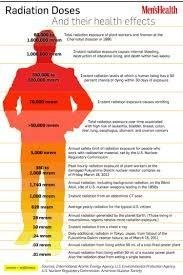Effective of radiation on human
Effect of Radiation on human health Radiation sickness is damage to your body caused by a large dose of radiation often received over a short period of time (acute). The amount of radiation absorbed by the body — the absorbed dose — determines how sick you'll be.
 # header
# header
Radiation sickness is also called acute radiation sickness, acute radiation syndrome or radiation poisoning. Common exposures to low-dose radiation, such as X-ray or CT examinations, don't cause radiation sickness.
Although radiation sickness is serious and often fatal, it's rare. Since the atomic bombings of Hiroshima and Nagasaki, Japan, during World War II, most cases of radiation sickness have occurred after nuclear industrial accidents such as the 1986 fire that damaged the nuclear power plant at Chernobyl or the 2011 earthquake that damaged the nuclear power plant on the east coast of Japan.
SYMPTOMS
The severity of signs and symptoms of radiation sickness depends on how much radiation you've absorbed. How much you absorb depends on the strength of the radiated energy and the distance between you and the source of radiation. Signs and symptoms also are affected by the type of exposure — such as total or partial body and whether contamination is internal or external — and how sensitive to radiation the affected tissue is. For instance, the gastrointestinal system and bone marrow are highly sensitive to radiation.
Absorbed dose and duration of exposure
The absorbed dose of radiation is measured in a unit called a gray (Gy). Diagnostic tests that use radiation, such as an X-ray, result in a small dose of radiation — typically well below 0.1 Gy, focused on a few organs or small amount of tissue.
Signs and symptoms of radiation sickness usually appear when the entire body receives an absorbed dose of at least 1 Gy. Doses greater than 6 Gy to the whole body are generally not treatable and usually lead to death within two days to two weeks, depending on the dose and duration of the exposure.
Initial signs and symptoms
The initial signs and symptoms of treatable radiation sickness are usually nausea and vomiting. The amount of time between exposure and when these symptoms develop is an indicator of how much radiation a person has absorbed.
After the first round of signs and symptoms, a person with radiation sickness may have a brief period with no apparent illness, followed by the onset of new, more serious symptoms.
In general, the greater your radiation exposure, the more rapid and more severe your symptoms will be.
Early symptoms of radiation sickness Mild exposure (1-2 Gy)Moderate exposure (2-6 Gy)Severe exposure (6-8 Gy)Very severe exposure (8-10 Gy or higher) Nausea and vomitingWithin 6 hoursWithin 2 hoursWithin 1 hourWithin 10 minutes Diarrhea--Within 8 hoursWithin 3 hoursWithin 1 hour Headache--Within 24 hoursWithin 4 hoursWithin 2 hours Fever--Within 3 hoursWithin 1 hourWithin 1 hour Later symptoms of radiation sickness Dizziness and disorientation-- --Within 1 weekImmediate Weakness, fatigueWithin 4 weeksWithin 1-4 weeksWithin 1 weekImmediate Hair loss, bloody vomit and stools, infections, poor wound healing, low blood pressure--Within 1-4 weeksWithin 1 weekImmediate
Adapted from Radiation exposure and contamination. The Merck Manuals: The Merck Manual for Healthcare Professionals.
When to see a doctor
An accident or attack that causes radiation sickness would no doubt cause a lot of attention and public concern. If such an event occurs, monitor radio, television or online reports to learn about emergency instructions for your area.
If you know you've been exposed to radiation, seek emergency medical care.
CAUSES
Radiation is the energy released from atoms as either a wave or a tiny particle of matter. Radiation sickness is caused by exposure to a high dose of radiation, such as a high dose of radiation received during an industrial accident. Common exposures to low-dose radiation, such as X-ray examinations, don't cause radiation sickness.
Sources of high-dose radiation
Possible sources of high-dose radiation include the following:
An accident at a nuclear industrial facility An attack on a nuclear industrial facility Detonation of a small radioactive device Detonation of a conventional explosive device that disperses radioactive material (dirty bomb) Detonation of a standard nuclear weapon Radiation sickness occurs when high-energy radiation damages or destroys certain cells in your body. Regions of the body most vulnerable to high-energy radiation are cells in the lining of your intestinal tract, including your stomach, and the blood cell-producing cells of bone marrow.
COMPLICATIONS
Radiation exposure that causes immediate radiation sickness significantly increases a person's risk of developing leukemia or cancer later in life.
Having radiation sickness could also contribute to both short-term and long-term mental health problems, such as grief, fear and anxiety about: